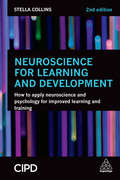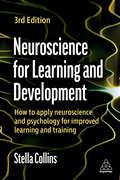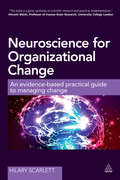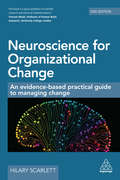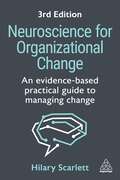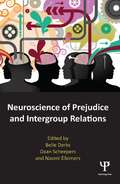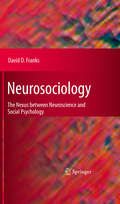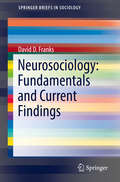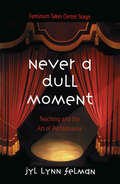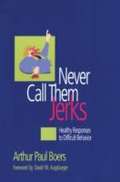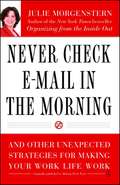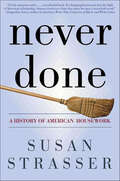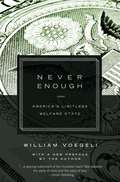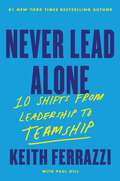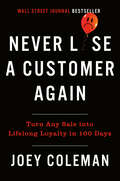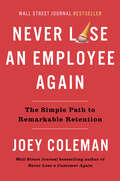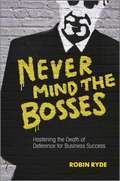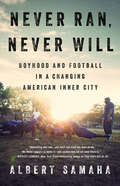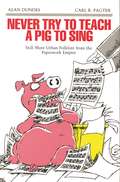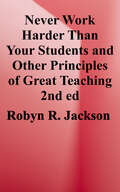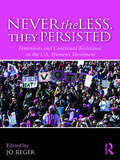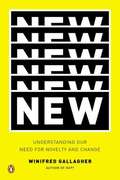- Table View
- List View
Neuroscience for Learning and Development: How to Apply Neuroscience and Psychology for Improved Learning and Training
by Stella CollinsIn order to design and deliver effective Learning and Development (L&D) initiatives, it is essential to understand how our brains work to learn, process and retain information. Neuroscience for Learning and Development introduces the latest research and concepts in the field, equipping learning and development and training professionals with an understanding of some of the inner workings of the mind. Covering areas such as how to create effective learning environments, promoting motivation and how to make learning 'stickier' through using stories and narratives, this book offers practical tools and ideas that can be applied in a variety of contexts, from training sessions and coaching conversations, to lectures and presentations. Featuring insights from L&D practitioners who have applied such approaches in practice, readers will not only find new techniques to implement right away, but also discover the research that backs up what they are already doing well, enabling them to make convincing cases to budget holders.This updated second edition of Neuroscience for Learning and Development contains new chapters on digital learning and the importance of rest and sleep, as well as updated wider content and new material on mindfulness, learning through your senses, and the neuroscience of habits.
Neuroscience for Learning and Development: How to Apply Neuroscience and Psychology for Improved Learning and Training
by Stella CollinsNeuroscience for Learning and Development provides L&D professionals the tools and ideas to design and deliver effective initiatives with knowledge of how our brains process information.Using the latest research and concepts, this book covers areas such as motivation, habits and the link between sleep and learning. It demonstrates how to create effective learning environments and make learning 'stickier' with advancements in AI and digital learning, and through the use of stories. The practical tools and guidance can be applied in different contexts, such as digital learning, in-person training sessions and presentations.The third edition contains a new chapter on creating an autonomous learning culture. It explains the strategies, tools and techniques L&D professionals can use to encourage and support employees to learn in the flow of work. With insights from L&D practitioners who have applied these approaches in organizations such as The Open University, this edition is an indispensable book for creating and maintaining workplace learning that benefits people and organizations.
Neuroscience for Organizational Change
by Hilary ScarlettUnderstanding how employees' brains work enables organizations to build cultures, design structures and processes that help people to be more innovative, productive and engaged. This has lasting impact in terms of meeting business objectives and becoming an employer of choice. We need to change the way we manage change in organizations: by understanding the brain we can do this better. Neuroscience brings a new lens through which to look at people and to understand why they react to situations in a certain way, what they need from work relationships to perform at their best, and how they might be better motivated. Neuroscience for Organizational Change not only provides evidence that will persuade the most sceptical of leaders but also provides many practical examples of how to apply the insights. The book provides a 'win-win': it will enable the organization to improve performance and also help to support the mental and emotional well-being of employees. Amongst other areas, Neuroscience for Organizational Change explores why we find organizational change difficult and what we can do to keep people focused and performing at their best. It looks at our need for social connection at work, the essential role that leaders and managers play, how best to manage emotions and reduce bias to avoid making flawed decisions, and why we need communication, involvement and storytelling to help us through change. It also sets out a new science-based planning tool, SPACES, to enhance motivation. Drawing on the author's successful masterclasses, Neuroscience for Organizational Change provides practical guidance and examples from big-name organizations such as Lloyds Banking Group, Department for Business, Innovation and Skills, Orbit Housing Group and BAE Systems. Each chapter includes checklists and questions to help the reader to reflect on what they might take away and apply to the specific context of their own organization.
Neuroscience for Organizational Change: An Evidence-based Practical Guide to Managing Change
by Hilary ScarlettOrganizational change can be unpredictable and stressful. With a better understanding of what our brains need to focus and perform at their best, organizations and leaders can increase employee engagement, productivity and well-being to successfully manage such periods of uncertainty. Drawing on the latest scientific research and verified by an independent neuroscientist, Neuroscience for Organizational Change explores the need for social connection at work, how best to manage emotions and reduce bias in decision-making, and why we need communication, involvement and storytelling to help us through change. Practical tips and suggestions can be found throughout, as well as examples of how these insights have been applied at organizations such as Lloyds Banking Group and GCHQ. The book also sets out a practical science-based planning model, SPACES, to enhance engagement. This updated second edition of Neuroscience for Organizational Change contains new chapters on planning the working day with the brain in mind and on overcoming the difficulties related to behavioural change. It also features up-to-the-minute wider content reflecting the latest insights and developments, and updated case studies from the first edition which give a long-term view of the benefits of applying neuroscience in organizations.
Neuroscience for Organizational Change: An Evidence-based Practical Guide to Managing Change
by Hilary ScarlettOrganizational change can be unpredictable and stressful. With a better understanding of what our brains need to focus, organizations can increase employee engagement, productivity and wellbeing to successfully manage periods of uncertainty. Drawing on the latest scientific research, the third edition of Neuroscience for Organizational Change brings the work of neuroscientists out of the lab and into the workplace in a practical and accessible way. It explores the need for social connection at work, how best to manage emotions, how to top up our mental energy, what influences our behaviour and our decision-making and why we need communication, involvement and collaboration to help us through change.This updated edition features a new chapter on neurodiversity and psychological safety, as well as new content based on the latest fascinating insights from neuroscience such as the impact of interoception on our decision-making, how to create a 'challenge' mindset at work, what makes us more receptive to feedback and the role of interbrain synchronization in team performance and collaboration. Full of practical tips, interviews and examples of how these insights have been applied from organizations such as PepsiCo, the Neurodiversity Employee Resource Group at Philips and the UK's Office for National Statistics, this essential guide provides a long-term view of the benefits of applying neuroscience in organizations.
Neuroscience of Prejudice and Intergroup Relations
by Naomi Ellemers Belle Derks Daan ScheepersPsychological research on the origins and consequences of prejudice, discrimination, and stereotyping has moved into previously uncharted directions through the introduction of neuroscientific measures. Psychologists can now address issues that are difficult to examine with traditional methodologies and monitor motivational and emotional as they develop during ongoing intergroup interactions, thus enabling the empirical investigation of the fundamental biological bases of prejudice. However, several very promising strands of research have largely developed independently of each other. By bringing together the work of leading prejudice researchers from across the world who have begun to study this field with different neuroscientific tools, this volume provides the first integrated view on the specific drawbacks and benefits of each type of measure, illuminates how standard paradigms in research on prejudice and intergroup relations can be adapted for the use of neuroscientific methods, and illustrates how different methodologies can complement each other and be combined to advance current insights into the nature of prejudice. This cutting-edge volume will be of interest to advanced undergraduates, graduates, and researchers students who study prejudice, intergroup relations, and social neuroscience.
Neurosociology
by David D. FranksThe goal of this ground-breaking volume is to present how neuroscience research is relevant to sociologists and social psychologists as well as examining those areas of neuroscience that can refine and broaden sociological theory. The study of the brain and its effect on behavior grew to prominence in the mid-20th century. Neuroscientists and psychologists worked together in this area in the behavioral sciences but neuroscience has not had a big impact in sociology and the social sciences. Recently, neuroscientists have presented new research which has a direct impact on many areas of sociology. These include the human "self", the social nature of mind, socialization and language acquisition, role-taking and role-making, consciousness, intersubjectivity, a balanced social constructionism, human agency and the necessity of emotion for rational decision making. These are only some of the areas of sociology which and to which they have contributed important refinements.
Neurosociology: Fundamentals and Current Findings (SpringerBriefs in Sociology)
by David D. FranksThis book offers an introduction to the fundamentals of neurosociology and presents the newest issues and findings in the field. It describes the evolution of the brain and its social nature. It examines the concept of knowing and what can be known, as well as the subjective sensations we experience. Next, it explores the ubiquitousness of New Unconsciousness and the latest conclusions about mirror neurons. Additional themes and concepts described are sex differences in the brain, imitation, determinism and agency.The book brings together neuroscience and sociology, two fields that are very different in terms of method, theory, tradition and practice. It does so building on the following premise: If our brains have been forged evolutionarily over the many centuries for social life, sociologists should have the opportunity, if not the duty, to know about it whatever the reservations of some who think that any approach that includes biology must be reductionistic.
Neuroökonomie: Eine wissenschaftstheoretische Analyse
by Lena DreherDas vorliegende Open-Access-Buch gibt einen Überblick über die Entwicklung der Neuroökonomie und ihre Fragestellungen. Die Neuroökonomie ist ein noch relativ junger Wissenschaftszweig, in dem kognitive Neurowissenschaftler und Ökonomen zusammenarbeiten. Dabei werden die neurologischen Prozesse bei der Verarbeitung ökonomischer Entscheidungen untersucht. Lena Dreher beleuchtet die Suche nach neuen Modellen für die Erforschung menschlicher Entscheidungsfindung und analysiert das Vorgehen der Neuroökonomie. Dabei werden auch die methodischen Probleme und vorgebrachten Kritiken untersucht. Die wissenschaftstheoretischen Erläuterungen der Mutterwissenschaften und wie ihre Fragestellungen und Arbeitsweisen in der Neuroökonomie zusammenkommen, machen die Methoden und Probleme der Neuroökonomie verständlich.Dies ist ein Open-Access-Buch.
Neutral Accent: How Language, Labor, and Life Become Global
by A. AneeshIn Neutral Accent, A. Aneesh employs India's call centers as useful sites for studying global change. The horizon of global economic shift, the consequences of global integration, and the ways in which call center work "neutralizes" racial, ethnic, and national identities become visible from the confines of their cubicles. In his interviews with call service workers and in his own work in a call center in the high tech metropolis of Gurgoan, India, Aneesh observed the difficulties these workers face in bridging cultures, laws, and economies: having to speak in an accent that does not betray their ethnicity, location, or social background; learning foreign social norms; and working graveyard shifts to accommodate international customers. Call center work is cast as independent of place, space, and time, and its neutrality--which Aneesh defines as indifference to difference--has become normal business practice in a global economy. The work of call center employees in the globally integrated marketplace comes at a cost, however, as they become disconnected from the local interactions and personal relationships that make their lives anything but neutral.
Never A Dull Moment: Teaching and the Art of Performance
by Jyl Lynn FelmanTeachers are really performers, classrooms are stages, and students the captivated audience. In beautiful prose, Felman invites us to watch her one woman show on the art of performance in today's classrooms. These essays take on the greatest hits of the academy: identity politics, sexual harrassment, academic censorship, and radical pedagogy. Felman's book is a performance not to be missed.
Never Call Them Jerks: Healthy Responses To Difficult Behavior
by Arthur Paul BoersNo church is immune to the problems that can arise when parishioners behave in difficult ways. Responding to such situations with self-awareness and in a manner true to one's faith tradition makes the difference between peace and disaster. In this must-read book, Boers shows how a better understanding of difficult behavior can help congregational leaders avoid the trap of labeling such parishioners and exercise self-care when the going gets rough.
Never Check E-Mail In the Morning: And Other Unexpected Strategies for Making Your Work Life Work
by Julie MorgensternIS IT ME OR IS IT THEM?Maintaining control in today's hectic workplace is a challenge -- everything is lean, competitive, and uncertain. What does it take to survive?Making Work Work is Julie Morgenstern's most important book yet. Through the mastery of brand-new strategies, Morgenstern shows you how small changes in your thinking and behavior will help you achieve the seemingly impossible -- boost your value, increase your job security, and afford you the time to still have a life.Morgenstern has helped clients of all levels take control of their work lives in every industry: from corporations and nonprofits to government agencies and small businesses; from executives and assistants to educators and salespeople. She's learned that no matter who you are, happiness at work involves feeling appreciated, in control, successful, and in balance. And achieving that is possible.People rarely look at their jobs from a psychological and practical perspective at the same time, but Julie Morgenstern does. This book mirrors the individual consulting services she provides by showing you how to start with yourself and then tackle the more complex external issues of working relationships and the job. For every obstacle you encounter along the way, Morgenstern diagnoses the source of the problem (is it you or them?), and with insight and warmth, she provides simple grab-and-go strategies. These are small changes anyone can make to improve performance and efficiency at work.At its core, Making Work Work is about your relationship to your job. With the reliable, methodical process taught in this book, you will: feel less trapped and more in charge be able to make a bad situation better search for a job that's a better fit for who you are.This is a provocative and life-changing book that will help you boost your clarity, confidence, and performance in any economic climate. With Morgenstern's guidance you can find a way to make work work.
Never Done: A History of American Housework
by Susan StrasserNever Done is the first history of American housework. Beginning with a description of household chores of the nineteenth century--cooking at fireplaces and on cast-iron stoves, laundry done with wash boilers and flatirons, endless water hauling and fire tending--Susan Strasser demonstrates how industrialization transformed the nature of women's work. Lightening some tasks and eliminating the need for others, new commercial processes inexorably altered women's daily lives and relationships--with each other and with the people they served.In this lively and authoritative book, Strasser weaves together the history of material advances and discussions of domestic service, "women's separate sphere" and the impact of advertising, home economics and women's entry into the workforce.Hailed as pathbreaking when originally published, Never Done remains an eye-opening examination of daily life in the American past.
Never Enough
by William VoegeliSince the beginning of the New Deal, American liberals have insisted that the government must do more-much more-to help the poor, to increase economic security, to promote social justice and solidarity, to reduce inequality, and to mitigate the harshness of capitalism. Nonetheless, liberals have never answered, or even acknowledged, the corresponding question: What would be the size and nature of a welfare state that was not contemptibly austere, that did not urgently need new programs, bigger budgets, and a broader mandate? Even though the federal government's outlays have doubled every eighteen years since 1940, liberal rhetoric is always addressed to a nation trapped in Groundhog Day, where every year is 1932, and none of the existing welfare state programs that spend tens of billions of dollars matter, or even exist.Never Enough explores the roots and consequences of liberals' aphasia about the welfare state's ultimate size. It assesses what liberalism's lack of a limiting principle says about the long-running argument between liberals and conservatives, and about the policy choices confronting America in a new century. Never Enough argues that the failure to speak clearly and candidly about the welfare state's limits has grave policy consequences. The worst result, however, is the way it has jeopardized the experiment in self-government by encouraging Americans to regard their government as a vehicle for exploiting their fellow-citizens, rather than as a compact for respecting one another's rights and safeguarding the opportunities of future generations.
Never Lead Alone: 10 Shifts from Leadership to Teamship
by Keith FerrazziA USA TODAY BESTSELLER • ONE OF FORBES TOP 10 BUSINESS BOOKS OF 2024ELEVATE LEADERSHIP TO TEAMSHIP.In today’s volatile, fast-paced, and decentralized business environment, even the most talented leaders can’t succeed alone—they need to mobilize the full potential of the team.The world’s highest-performing organizations understand they need more than leadership to win—they need teamship. Teamship is a profound shift from today’s hierarchical model to sharing the load among a team that elevates one another and the organization to achieve exponential results.Based on more than twenty years of research with more than three thousand teams, world-renowned coach and bestselling author Keith Ferrazzi has cracked the code on what defines the top 15 percent of teams. In Never Lead Alone, Ferrazzi brings to life what is expected of teammates in teamship’s new agile, inclusive, innovative, and challenge culture. Teamship combines:Co-elevation behaviors—the teammates’ commitment to pushing one another higher in aligned pursuit of the mission, andtwenty-first-century collaboration processes, practices, and tools to transform team performance.Through rigorous data, dozens of high-return practices, and vivid case studies you will learn:the 10 critical shifts to teamship, including peer-to-peer accountability, personal trust, shared feedback, team resilience, and adopting agile ways of working;how to agree on a new high-performance, high-integrity team social contract; andapproaches to leveraging collaborative technology and AI.Never Lead Alone is an essential step-by-step road map for every teammate and all leaders on their team’s journey from average to extraordinary.
Never Lose a Customer Again: Turn Any Sale into Lifelong Loyalty in 100 Days
by Joey ColemanAward-winning speaker and business consultant Joey Coleman teaches audiences and companies all over the world how to turn a one-time purchaser into a lifelong customer.Coleman's theory of building customer loyalty isn't about focusing on marketing or closing the sale: It's about the First 100 Days® after the sale and the interactions the customer experiences. While new customers experience joy, euphoria, and excitement, these feelings quickly shift to fear, doubt, and uncertainty as buyer's remorse sets in. Across all industries, somewhere between 20%-70% of newly acquired customers will stop doing business with a company with the first 100 days of being a new customer because they feel neglected in the early stages of customer onboarding. In Never Lose a Customer Again, Coleman offers a philosophy and methodology for dramatically increasing customer retention and as a result, the bottom line. He identifies eight distinct emotional phases customers go through in the 100 days following a purchase. From an impulse buy at Starbucks to the thoughtful purchase of a first house, all customers have the potential to experience the eight phases of the customer journey. If you can understand and anticipate the customers' emotions, you can apply a myriad of tools and techniques -- in-person, email, phone, mail, video, and presents -- to cement a long and valuable relationship.Coleman's system is presented through research and case studies showing how best-in-class companies create remarkable customer experiences at each step in the customer lifecycle. In the "Acclimate" stage, customers need you to hold their hand and over-explain how to use your product or service. They're often too embarrassed to admit they're confused. Take a cue from Canadian software company PolicyMedical and their challenge of getting non-technical users to undergo a complex installation and implementation process. They turned a series of project spreadsheets and installation manuals into a beautiful puzzle customers could assemble after completing each milestone. In the "Adopt" stage, customers should be welcomed to the highest tier of tribal membership with both public and private recognitions. For instance, Sephora's VIB Rogue member welcome gift provides a metallic membership card (private recognition) and a members-only shade of lipstick (for public display). In the final stage, "Advocate," loyal customers and raving fans are primed to provide powerful referrals. That's how elite entrepreneurial event MastermindTalks continues to sell-out their conference year after year - with zero dollars spent on marketing. By surprising their loyal fans with amazing referral bonuses (an all-expenses paid safari?!) they guarantee their community will keep providing perfect referrals. Drawing on nearly two decades of consulting and keynoting, Coleman provides strategies and systems to increase customer loyalty. Applicable to companies in any industry and of any size (whether measured in employee count, revenue, or total number of customers), implementing his methods regularly leads to an increase in profits of 25-100%. Working with well-known clients like Hyatt Hotels, Zappos, and NASA, as well as mom-and-pop shops and solo entrepreneurs around the world, Coleman's customer retention system has produced incredible results in dozens of industries. His approach to creating remarkable customer experiences requires minimal financial investment and will be fun for owners, employees, and teams to implement. This book is required reading for business owners, CEOs, and managers - as well as sales and marketing teams, account managers, and customer service representatives looking for easy to implement action steps that result in lasting change, increased profits, and lifelong customer retention.
Never Lose an Employee Again: The Simple Path to Remarkable Retention
by Joey ColemanIf keeping employees is a challenge for you, Never Lose an Employee Again offers a proven framework for increasing retention, engagement, and in the process, profits.Joey Coleman, one of the world's leading experts on employee experience, reveals practical strategies that will teach you exactly how to recruit top talent, bring them onboard successfully, and keep them engaged while they produce remarkable results for years to come.Finding and keeping quality employees is one of the greatest challenges facing businesses today. With more people quitting their jobs each month than ever before and employees demanding flexibility, freedom, and advancement, companies are struggling to build a foundation with new hires that leads to long-term commitment. To effectively combat the hiring crisis and remain competitive, business owners and managers must design an employee experience program that begins on day one.In Never Lose an Employee Again, Coleman offers a step-by-step playbook for creating a retention plan with long-term success. With more than fifty proven case studies from organizations on seven continents, Coleman details how you can forge a relationship with your people during each of the eight phases of the employee journey. For each phase, Coleman walks you through the six forms of communication integral to success (in-person, email, phone, mail, video, and even gifts) so you can better connect with your team. You&’ll learn how to:• write job descriptions that attract the right candidates (and plenty of them);• counter the &“hire&’s remorse&” that every employee feels (yet few businesses ever address);• welcome someone on their first day in a way that will leave them talking about it years later;• acclimate your people to get them up and running faster and more effectively;• re-engage your existing employees to turn them into raving fans;… and much more. Never Lose an Employee Again will reshape the way you think about recruiting, hiring, onboarding, and retaining quality team members–whether you are an owner looking to hire your first few employees, an organization hoping to redefine an industry, or an enterprise that needs to keep growing on a global scale.
Never Mind the Bosses
by Robin RydeOver the last few decades, power, information and resources have moved from being concentrated in the hands of a few, to being disbursed across many. We need look no further than events on the world stage to see the heat signature of this - from the arrival of Wikileaks, the Arab Spring of 2011 and the Occupy movements, to the social media revolution and flashpoints such as the British Members of Parliament expenses scandal. All are examples of deep change occurring.This book is about what this means for the workplace and for management. The proposition offered here is that our organisations need to catch up, and that the "death of deference" that we are seeing elsewhere in society needs to be accelerated in the workplace.Systems of deference slow down organisational performance. Deference prevents organisations from learning. It stops them from being agile, innovative and ethical. Deference is the enemy of organisational success and it needs to be dismantled so that in its place we can build modern organisations with a new breed of managers and leaders. This book offers a solution to a problem that belongs in the last century, and a game plan for nothing short of a workplace revolution."If deference is dead, this book is about the resurrection of the effective manager in a world where nothing is quite the way it used to be. Powerful and thought-provoking from start to finish." - Jeremy Vine, BBC Presenter and Author"Never Mind the Bosses is a refreshing type of management book, it advocates that deference to authority figures needs to go if we are to have engaged workforces."- Cary L. Cooper, CBE, Distinguished Professor of Organizational Psychology and Health at Lancaster University Management School"An engaging and entertaining romp through the post punk world. By going beyond the boundaries of most business books, Ryde gives us all food for thought about how organisations are, or are not, dealing with a rapidly changing society and workforce."- Jo Owen, bestselling author of 'How to Manage' and 'How to Lead'"If you are looking for a book that will shake up your thinking about how to improve your organization's performance - or worried that your competitors will find it first! - try this one."- Professor Dutch Leonard, Harvard Business School & Harvard University's John F. Kennedy School of Government
Never Ran, Never Will: Boyhood and Football in a Changing American Inner City
by Albert SamahaThis uplifting story of a boys' football team shines light on the under-appreciated virtues that can bloom in impoverished neighborhoods, even as nearby communities exclude them from economic progress.Never Ran, Never Will tells the story of the working-class, mostly black neighborhood of Brownsville, Brooklyn; its proud youth football team, the Mo Better Jaguars; and the young boys who are often at the center of both. Oomz, Gio, Hart, and their charismatic, vulnerable friends, come together on a dusty football field. All around them their community is threatened by violence, poverty, and the specter of losing their homes to gentrification. Their passionate, unpaid coaches teach hard lessons about surviving American life with little help from the outside world, cultivating in their players the perseverance and courage to make it.Football isn't everybody's ideal way to find the American dream, but for some kids it's the surest road there is. The Mo Better Jaguars team offers a refuge from the gang feuding that consumes much of the streets and a ticket to a better future in a country where football talent remains an exceptionally valuable commodity. If the team can make the regional championships, prestigious high schools and colleges might open their doors to the players.Never Ran, Never Will is a complex, humane story that reveals the changing world of an American inner city and a group of unforgettable boys in the middle of it all.
Never Try to Teach a Pig to Sing: Still More Urban Folklore from the Paperwork Empire
by Alan Dundes Carl R. PagterNever Try to Teach a Pig to Sing documents the thriving folklore tradition that circulates in the workplace. Alan Dundes and Carl Pagter have collected more than two hundred and fifty "signs of the times"--the office memoranda, parodies, cartoons, and poems that daily make their way through copy machines, interoffice mail systems, and fax machines and are affixed to bulletin boards and water coolers. The rich vein of urban folklore tapped by this imaginative volume constitutes a great testament to one of the world's most prolific authors--anonymous. The popularity of the items featured in this timely book is apparent by their reproduction in mass or popular cultural form--as greeting cards, plaques, and bumper stickers--reminding us of the inevitable interplay between folklore and mass culture. Dundes and Pagter clearly demonstrate the existence of folklore in the modern urban technological world and refute the notion that folklore reflects only the past.
Never Work Harder than Your Students and Other Principles of Great Teaching
by Robyn R. JacksonSome great teachers are born, but most are self-made. And the way to make yourself a great teacher is to learn to think and act like one. In this updated second edition of the best-selling Never Work Harder Than Your Students, Robyn R. Jackson reaffirms that every teacher can become a master teacher. The secret is not a specific strategy or technique, nor it is endless hours of prep time. It's developing a master teacher mindset-rigorously applying seven principles to your teaching until they become your automatic response: - Start where you students are. - Know where your students are going. - Expect to get your students there. - Support your students along the way. - Use feedback to help you and your students get better. - Focus on quality rather than quantity. - Never work harder than your students. In her conversational and candid style, Jackson explains the mastery principles and how to start using them to guide planning, instruction, assessment, and classroom management. She answers questions, shares stories from her own practice and work with other teachers, and provides all-new, empowering advice on navigating external evaluation. There's even a self-assessment to help you identify your current levels of mastery and take control of your own practice. Teaching is hard work, and great teaching means doing the right kind of hard work: the kind that pays off. Join tens of thousands of teachers around the world who have embarked on their journeys toward mastery. Discover for yourself the difference that Jackson's principles will make in your classroom and for your students.
Nevertheless, They Persisted: Feminisms and Continued Resistance in the U.S. Women’s Movement
by Jo Reger2017 opened with a new presidency in the United States sparking women’s marches across the globe. One thing was clear: feminism and feminist causes are not dead or in decline in the United States. Needed then are studies that capture the complexity of U.S. feminism. Nevertheless, They Persisted is an edited collection composed of empirical studies of the U.S. women’s movement, pushing the feminist dialogue beyond literary analysis and personal reflection by using sociological and historical data. This new collection features discussions of digital and social media, gender identity, the reinvigorated anti-rape climate, while focusing on issues of diversity, inclusion, and unacknowledged privilege in the movement.
New
by Winifred GallagherAn exploration of how humans respond to novelty from the New York Times-bestselling author of Rapt Why are we attuned to the latest headline, diet craze, smartphone, and fashion statement? Why do we relish a change of scene, eye attractive strangers, and develop new interests? Follow a crawling baby around and you'll see that right from the beginning, nothing excites us more than something new and different. Our unique human brains are biologically primed to engage with and even generate novelty. This "neophilia" has enabled us to thrive in a world of cataclysmic change, but now we confront an unprecedented deluge of new things--one that shows no sign of slowing. In New acclaimed behavioral science writer Winifred Gallagher, using cutting-edge research and interviews with countless experts, shows us how we can use our adaptive gift to navigate more skillfully through our rapidly changing world by focusing on the new things that really matter.
New African Diasporas (Global Diasporas)
by Khalid KoserThe extensive literature relating to the African diaspora has tended to concentrate on the descendants of those who left Africa as part of the slave trade to North America. This important new book gathers together work on more recent waves of African migration from some of the most exciting thinkers on the contemporary diaspora. Concentrating particularly on the last 20 years, the contributions look to the United States and beyond to diaspora settlement in the UK and Northern Europe. New African Diasporas looks at a range of different types of diaspora - legal and illegal, professional and low-skilled, asylum seekers and 'economic migrants' - and includes chapters on diasporic communities originating in Cote d'Ivoire, Democratic Republic of Congo, Eritrea, Ghana, Senegal and Somalia. It also examines often neglected differences based on gender, class and generation in the process. This book will be essential reading for anyone with an interest in the African diaspora and provides the most wide-ranging picture of the new African diaspora yet.
